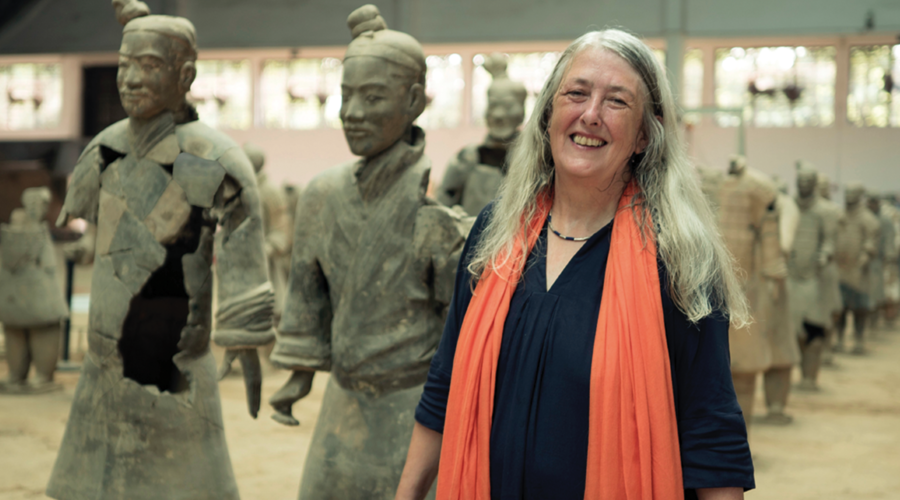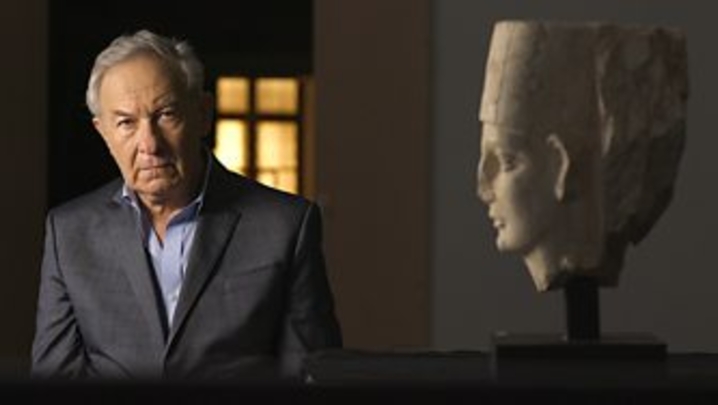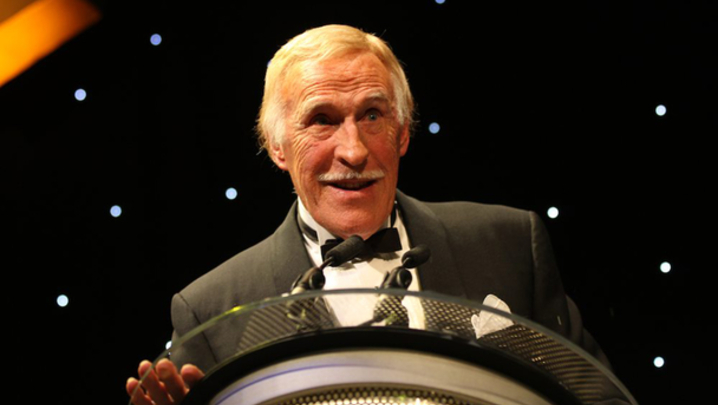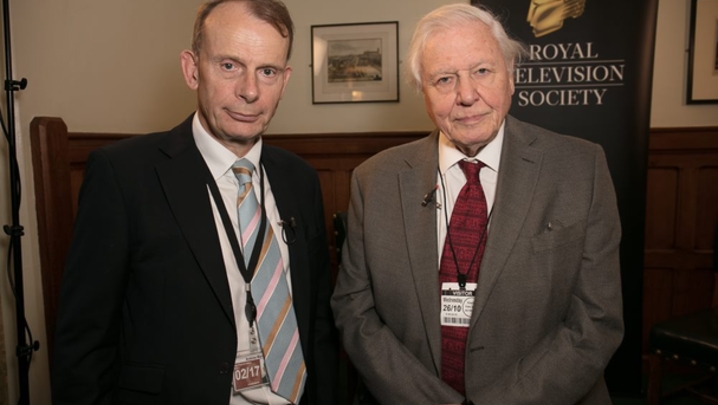Mary Beard tells Pippa Shawley why she was reluctant to become a TV presenter and reveals her own viewing habits
Mary Beard’s career began with a piece of cake. On a trip to the British Museum with her mother, a curator noticed her struggling to see one of the exhibits, a 3,000-year-old piece of carbonised cake from Ancient Egypt.
“He got his keys out, he opened the case, he got the bit of cake out and he showed it to me.” It was a “light-bulb moment” for the then five-year-old, and a lesson in the joy of sharing. “People will see you wanting to know something and they’ll get their keys and unlock the case.”
The classicist has built a career out of unlocking cases, as an academic at Cambridge and, more recently, as an author and broadcaster. Her latest case is Civilisations, the BBC’s much-anticipated culture series, which launched earlier this month.
The show arrived almost 50 years after Kenneth Clark’s Civilisation, which had been commissioned by David Attenborough when he was controller of BBC Two. At the launch of the new series, Sir David explained that the original programme was intended to sell more colour TV sets. The simple plan, he said, was “to get all the loveliest things in colour [and] put them in a chronological order and to contemporary music”.
The task for the 2018 series was rather more ambitious. “You couldn’t make a history of European history now and just call it Civilisation,” says Beard, who presents two episodes of the new series, alongside Simon Schama and David Olusoga, “but it does mean there’s a lot to do.”
For the new series, the team headed to 31 countries across six continents, rather than focusing on Western Europe as Clark had done.
“If you’re doing, in principle, the world, you can’t do it chronologically. You can’t say, ‘Meanwhile, in Australia…’,” says the professor. “That’s quite frightening when you start, but it’s also liberating. It means that what has to drive this is the argument.”
Executive producer for the BBC Jonty Claypole said he wanted nine “polemical essays” to drive the series, and that it was important to feature different voices to reflect the number of narratives in the representation of history.
In her episodes, Beard looks at the depiction of the human body, from the Terracotta Army in China, to the Colossi of Memnon in Egypt, and at the relationship between religion and art, for which she visited Angkor Wat and Istanbul’s Blue Mosque.
The BBC’s publicity machine has gone full throttle to promote the show, but Beard says that the filming was much the same as the other history programmes she’s worked on.
“You still go to the same slightly grotty hotels and you still complain about the food being dreadful,” she recounts. “Television crews are wonderful complainers, me included.”
The classicist was fairly late to programme-making. She was approached by former BBC Two controller Janice Hadlow, who had read her book about Pompeii while on holiday. Beard was reluctant at first: “I knew that television was terribly time consuming, and I don’t have very much patience.”
Hadlow persuaded her, however, suggesting that the academic should put her money where her mouth was and, instead of complaining about too many “wrinkly old guys wearing suits”, she should have a go herself. “At this point, I thought, ‘I’ve been snookered’,” she confesses.
Pompeii: Life and Death in a Roman Town was nominated for a Bafta and paved the way for more series about the ancient world, including Caligula with Mary Beard and Mary Beard’s Ultimate Rome.
Today, despite a growing library of television series under her belt, Beard still regards television as a hobby. Broadcasting has added another element of fun to her job as a classicist, but she identifies as an academic.
By the time the television commissioners came knocking, she had built a career as a classicist, and rigorous academic debates had made her resilient in the face of criticism. It’s just as well. While her programmes have been popular with audiences, her presenting style has divided the critics.
She remembers telling Hadlow: “‘I don’t think AA Gill will like it.’ I was right. Absolutely psychic.”
"I wasn’t particularly hooked on the highbrow"
The late Sunday Times critic seized on Beard’s appearance, writing: “For someone who looks this closely at the past, it is strange she hasn’t had a closer look at herself before stepping in front of a camera. Beard coos over corpses’ teeth without apparently noticing she is wearing them.”
While such scathing personal attacks would leave some retreating to the shelter of the university library, Beard has taken her critics head on. She regularly rebuts arguments on her blog, A Don’s Life, which she writes for the Times Literary Supplement, but she also takes on the Twitter trolls.
“It would be wrong to say that it doesn’t bother you at all [when] you look at your phone and you discover that kind of crap,” she says. “I think that, when I was younger, that sort of stuff would have bothered me much more.”
She ignores the popular Twitter advice – “Do not feed the trolls” – and responds to many of her abusers.
“It would be wrong to say that the majority apologise, that would not be true,” she admits, “but enough do so to make it worthwhile.”
A few days after we meet, one of Beard’s own tweets makes a stir.
“Of course one can’t condone the (alleged) behaviour of Oxfam staff in Haiti and elsewhere,” she tweeted. “But I do wonder how hard it must be to sustain ‘civilised’ values in a disaster zone. And overall I still respect those who go in to help out, where most of us wd [sic] not tread.”
Her poorly worded missive was met with a backlash, including accusations of colonialism and racism.
“I was certainly not saying that Haiti was uncivilised,” she later wrote in a blog post. “Mea culpa if it looked as if I was (it just happens to be the precise opposite of what I believe!)” Just days before, she had said over tea and biscuits that “absolutely everyone who uses Twitter says something stupid from time to time”. Psychic, once again.
The issue highlights the complexity of Beard’s approach to public life. She is generous with her time, engaging in email correspondence with people who want suggestions for reading material, replying to the tweets she receives, both positive and negative, and accepting invitations to go on programmes such as Question Time. Academia has helped her build a thick skin to disagreements.
While her first instinct was to decline the invitation, she agreed to join the Question Time panel “because it seems chicken not to”. She also did it because she was curious about how it worked, and who she would meet. “I’ve made some good friends on Question Time, because everyone is so fucking terrified,” she laughs. “You bond. It is as if you’ve all been kidnapped.”
She believes that non-politicians have a civic duty to get involved in politics: “There’s an obligation on citizens to participate the best they can and not to leave politics to professional politicians.”
As someone who is not afraid of debate or strong opinions, she strikes me as a person who might have pursued a career as a politician. “I think it’s too late,” she says, but she would have considered it if someone had suggested it when she was younger.
A long-time Labour Party member (she has now left the party), she thinks that she would struggle to toe the party line. Backbench life would not suit her, either: “I wonder if anybody really goes into politics thinking, ‘Do you know what I want to be? I want to be a backbencher for ever.’… You watch these idiots on the front bench and you think: ‘I can do better than that!’”
For now, Beard hopes has found her niche as an outspoken classics don who is vocal about the public’s role in politics. “It’s no good just tut-tutting about how professional politicians are,” she advises.
She is, at heart, an educator, passionate about sharing stories, whether in the lecture theatre, in books or on TV and radio. She defies most of the stereotypes of a classics teacher, drawing you into her world, rather than sending you to sleep. She is not an intellectual snob.
While she battles great academic theories at Cambridge, she also loves to binge-watch box sets, most recently the third series of Broadchurch and Endeavour. BBC One’s long-running medical soap Casualty provided a much-needed break when her children were young. “It was my real pleasure when the kids were very small: get the buggers off to bed, bottle of wine, Casualty,” she recalls.
Growing up in Shropshire, she watched “everything”. “There wasn’t much else to do where I came from,” she says. Her favourite shows included Monty Python, Crossroads and Till Death Us Do Part. “I wasn’t particularly hooked on the highbrow, I’m happy to say.”
Not having much to do led the young Beard to explore what was on her doorstep. At the time, there were lots of opportunities for teenagers to get involved in archaeological digs. “Part of the pleasure of going on an archaeological excavation was to get away from the parents,” she admits, “while doing something that was absolutely pukka and intellectual. The act of getting bored can be a more stimulating one than people think,” she believes, as it drives people to think.
She hopes her own programmes and books inspire people to get out and explore the arguments she has put forward. “What you want to do is give people some insights and some tools that they can use for themselves,” she explains, “not just to look at your programme and go, ‘Oh right, fine, lovely. God, wasn’t that amazing?’”
In this spirit, she will follow her episodes of Civilisations with an extra 60-minute show called Civilisations On Our Doorstep.
In it, she travels around Britain, looking at what lies in museum collections outside of London. The idea is to take the theories that have been presented in the main series, and get the public to go and investigate in their local museums.
“Inside any local museum there is something wonderful,” she says. The programme ties in with the BBC’s wider relationship with museums for the Civilisations Festival, which aims to shine a spotlight on the collections of partnering museums.
More than 250 organisations have signed up for the festival, from national ones, such as the British Museum and the National Army Museum, to smaller establishments, including Wakefield Library and Torquay Museum.
The show will also examine what is meant by the term “civilisation”, a word so complex it is unlikely to be solved in an hour-long episode. “Who is civilised?” asks Beard. “Who would actually avow it? Who would get up and say, “Well, I am civilised’? You wouldn’t.”
The classicist may not have all the answers, but she will never shy away from the big questions.





